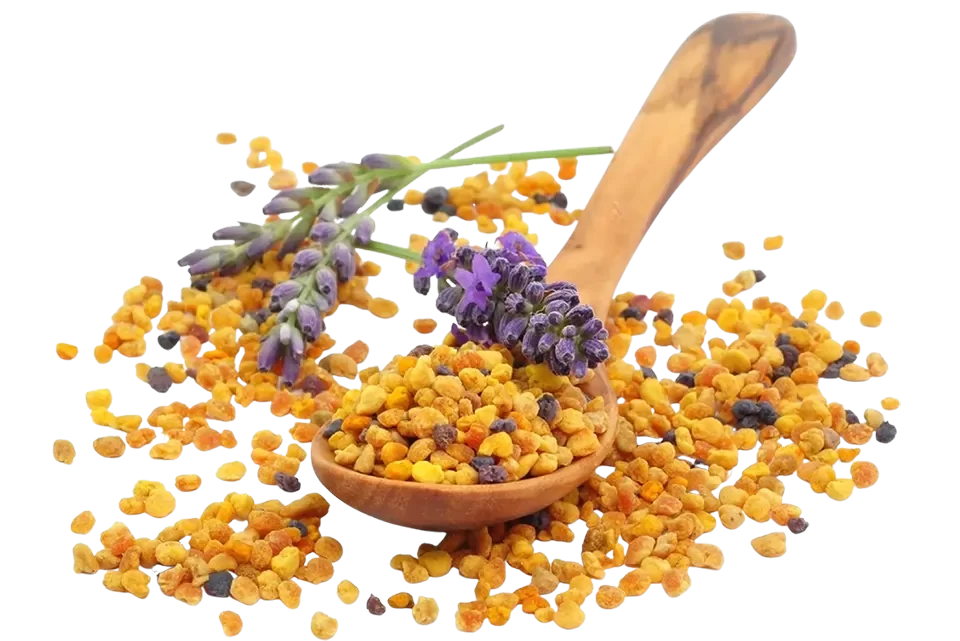Blog
Are you looking for a nutritious and healthy food supplement? Look no further than bee pollen! This natural and organic substance is collected by bees while pollinating flowering plants and is often considered a superfood due to its high nutritional value. Bee pollen is packed with carbohydrates, protein, amino acids, vitamins, and minerals, making it an excellent energy source for those seeking a healthy diet.

Bee Pollen: The Superfood with Countless Benefits for Your Health
Here are some of the benefits of consuming bee pollen:
1. High nutritional value
Bee pollen is a highly nutritious food that contains all the essential nutrients the body requires. It is rich in protein, amino acids, vitamins, and minerals, making it an excellent energy source for individuals looking for a healthy diet.
2. Allergy relief
Bee pollen is effective in relieving seasonal allergies. According to a study conducted by the International Archives of Allergy and Immunology, bee pollen therapy significantly reduced the symptoms of hay fever, including sneezing, runny nose, and itchiness.
3. Anti-inflammatory benefits
Bee pollen has anti-inflammatory properties that can help reduce inflammation in the body. A study published in Nutrients in 2022 found that Bee pollen contains antibacterial and antioxidant components such as flavones and polysaccharides, and the flavone component can also suppress COX-2 activity in gingival tissues, making it an excellent anti-inflammatory agent.
4. Antioxidant support
Bee pollen is rich in antioxidants such as phenolic acids, flavonoids, and carotenoids, which can help prevent damage to the body caused by free radicals. These antioxidants can help reduce the risk of chronic diseases, including cancer and heart disease.
5. Boosts the immune system
Bee pollen has been shown to enhance the immune system's function by increasing the production of lymphocytes and antibodies. This increased immune function can help prevent infections and other diseases.
6. Skin health
Bee pollen supplements have been found to improve skin health by reducing the appearance of wrinkles and increasing skin hydration. The antioxidants contained in bee pollen can help protect the skin from damage caused by UV radiation and other environmental stressors.
7. Sexual benefits
- Increased libido: Bee pollen is rich in zinc, which is strongly connected to sex drive. As a natural libido enhancer abundant in zinc, bee pollen is a fantastic superfood supporting men's sexual health.
- Improved fertility: According to the article in Antioxidants, bee pollen shows potential for improving fertility. The administration of bee pollen in various studies resulted in significant increases in testis weight, testosterone, LH, and FSH levels, as well as sperm count, motility, and viability. These improvements are partly due to the scavenging of toxic and mutagenic electrophiles and free radicals and the modification of antioxidant pathways, which can be attributed to the presence of flavonoids in bee pollen. In the mentioned studies, bee pollen demonstrated positive effects on spermatogenesis, protection against testis cell injury, and anti-inflammatory properties.
- Hormone balancing: Bee pollen contains plant compounds that may help balance hormones in the body, which could positively affect sexual health.
- Enhanced energy and stamina: Bee pollen is a rich source of nutrients, including vitamins, minerals, and antioxidants, which may help to improve overall energy levels and stamina in the body.
8. Weight management
According to a study published in the journal Nutrients, it is evident that bee pollen may have potential benefits for weight management due to its anti-obesity effects, modulation of lipid metabolism, and appetite regulation. Furthermore, bee pollen has been reported to possess thermogenic properties, which may help increase energy expenditure and enhance fat oxidation, thereby aiding in weight management.
9. Liver protection
Bee pollen contains many nutritional compounds that can support liver health, including antioxidants, amino acids, fatty acids, and carotenoids. Antioxidants like quercetin and rutin can help protect liver cells from damage by neutralizing free radicals.
10. Anemia treatment
Bee pollen has been found to be beneficial in treating anemia due to its rich iron and vitamin B12 content. Iron is a crucial component of hemoglobin, which is the oxygen-carrying protein in red blood cells. Vitamin B12 is essential for the production of red blood cells and proper functioning of the nervous system. Thus, consuming bee pollen may help improve anemia by providing essential nutrients required for red blood cell production and optimal blood health.
11. Cancer prevention and treatment
Bee pollen is rich in antioxidants and flavonoids, which can help to neutralize free radicals that can damage cells and lead to cancer. A study published in Food Hydrocolloids for Health in 2023 found that bee pollen has a potent anticancer efficacy. Another study published in Nutrients in 2022 indicates that bee pollen can reduce tumor growth.
12. Heart Health
Bee pollen contains several nutrients and bioactive compounds, such as omega-3 fatty acids, flavonoids, and antioxidants, which have been established to contribute to cardiovascular health. The regular consumption of bee pollen may help support heart health by reducing blood pressure, lowering cholesterol levels, and improving blood circulation. These benefits make bee pollen a valuable addition to a heart-healthy diet.
13. Improved memory and cognitive function
Bee pollen may also improve memory and cognitive function. According to a study published in the Biological and Pharmaceutical Bulletin in 2019, bee pollen is a helpful agent for treating cognitive dysfunction. Another study published in Antioxidants in 2023 demonstrates that bee pollen is good for Parkinson’s and Alzheimer’s diseases as it has antioxidant properties that can help reduce oxidative stress, which is one of the factors contributing to the development of Parkinson’s and Alzheimer’s diseases.
In conclusion, bee pollen is a highly nutritious substance that has many potential health benefits. It can help relieve allergies, reduce inflammation, boost the immune system, provide antioxidant support, and improve skin health. These benefits make bee pollen a superfood that customers should consider including in their diet. Consult your doctor before consuming bee pollen to avoid any negative interactions with existing health conditions or medications.
References:
- Komosinska-Vassev, K., Olczyk, P., Kafmierczak, J., Mencner, L., & Olczyk, K. (2015). Bee pollen: Chemical composition and therapeutic application. Evidence-based complementary and alternative medicine : eCAM, 2015, 297425. https://doi.org/10.1155/2015/297425
- Almeida-Muradian, L. B., Pamplona, L. C., Coimbra, S., & Barth, O. M. (2005). Chemical composition and botanical evaluation of dried bee pollen pellets. Journal of Food Composition and Analysis, 18(1), 105-111. https://doi.org/10.1016/j.jfca.2003.10.008
- Denisow, B., & Denisow-Pietrzyk, M. (2016). Biological and therapeutic properties of bee pollen: a review. *Journal of the Science of Food and Agriculture*, 96(13), 4303-4309. https://doi.org/10.1002/jsfa.7729
- Ishikawa, Y., Tokura, T., Nakano, N., Hara, M., Niyonsaba, F., Ushio, H., Yamada, H., Kitagawa, Y., Okumura, K., & Ogawa, H. (2008). Inhibitory effect of honeybee-collected pollen on mast cell degranulation in vivo and in vitro. Journal of Medicinal Food, 11(1), 14-20. https://pubmed.ncbi.nlm.nih.gov/18361733/
- Rzepecka-Stojko, A., Stojko, J., Kurek-Górecka, A., Górecki, M., Kabała-Dzik, A., Kubina, R., & Moździerz, A. (2015). Polyphenols from bee pollen: Structure, absorption, metabolism and biological activity. *Molecules*, 20(12), 21732-21749. https://doi.org/3390/molecules201219800
- Campos, M. G. R., Bogdanov, S., de Almeida-Muradian, L. B., Szczesna, T., Mancebo, Y., Frigerio, C., & Ferreira, F. (2008). Pollen composition and standardisation of analytical methods. *Journal of Apicultural Research*, 47(2), 154-161. https://doi.org/10.1080/00218839.2008.11101443
- Lobo, V., Patil, A., Phatak, A., & Chandra, N. (2010). Free radicals, antioxidants and functional foods: Impact on human health. *Pharmacognosy Reviews*, 4(8), 118-126. https://doi.org/10.4103/0973-7847.70902
- Kassim, M., Achoui, M., Mansor, M., & Yusoff, K. M. (2010). The inhibitory effects of Gelam honey and its extracts on nitric oxide and prostaglandin E2 in inflammatory tissues. *Fitoterapia*, 81(8), 1196-1201. https://doi.org/10.1016/j.fitote.2010.07.024
- Li, F., Li, S., Li, H. B., Deng, G. F., Ling, W. H., Wu, S., Xu, X. R., & Chen, F. (2013). Antiproliferative activity of peels, pulps and seeds of 61 fruits. *Journal of Functional Foods*, 4(2), 509-518. https://doi.org/10.1016/j.jff.2013.04.016
- Olczyk, P., Komosinska-Vassev, K., Wisowski, G., Mencner, L., Stojko, J., & Kafmierczak, J. (2013). Propolis modulates fibronectin expression in the matrix of thermal injury. *BioMed Research International*, 2013, 290675. https://doi.org/10.1155/2014/748101
- Pascoal, A., Rodrigues, S., Teixeira, A., Feás, X., & Estevinho, L. M. (2014). Biological activities of commercial bee pollens: Antimicrobial, antimutagenic, antioxidant and anti-inflammatory. *Food and Chemical Toxicology*, 63, 233-239. https://doi.org/10.1016/j.fct.2013.11.010
- Khalifa, S.A.M.; Elashal, M.H.; Yosri, N.; Du, M.; Musharraf, S.G.; Nahar, L.; Sarker, S.D.; Guo, Z.; Cao, W.; Zou, X.; Abd El-Wahed, A.A.; Xiao, J.; Omar, H.A.; Hegazy, M.-E.F.; El-Seedi, H.R. (2021). Bee Pollen: Current Status and Therapeutic Potential. Nutrients 13, 1876. https://doi.org/10.3390/nu13061876
- Zaida Zakaria, Zaidatul Akmal Othman, Joseph Bagi Suleiman, Victor Udo Nna, Mahaneem Mohamed. "Pollen and bee bread and liver health." In: Dilek Boyacioglu (ed.), Bee Products and their Applications in the Food and Pharmaceutical Industries, Academic Press, 2022, pp. 283-314, ISBN 9780323854009, https://doi.org/10.1016/B978-0-323-85400-9.00017-4.
- Abbaspour, N., Hurrell, R., & Kelishadi, R. (2014). Review on iron and its importance for human health. *Journal of Research in Medical Sciences*, 19(2), 164-174. https://www.ncbi.nlm.nih.gov/pmc/articles/PMC3999603
- Green, R. (2017). Vitamin B12 deficiency from the perspective of a practicing hematologist. *Blood*, 129(19), 2603-2611. https://doi.org/10.1182/blood-2016-10-569186
- Nemany A.N. Hanafy, Elsayed I. Salim, Magdy E. Mahfouz, Eman A. Eltonouby, Izar H. Hamed. (2023). Fabrication and characterization of bee pollen extract nanoparticles: Their potential in combination therapy against human A549 lung cancer cells. Food Hydrocolloids for Health, 3, 100110. ISSN 2667-0259. https://doi.org/10.1016/j.fhfh.2022.100110
- Algethami, J. S., El-Wahed, A. A. A., Elashal, M. H., Ahmed, H. R., Elshafiey, E. H., Omar, E. M., Naggar, Y. A., Algethami, A. F., Shou, Q., Alsharif, S. M., Xu, B., Shehata, A. A., Guo, Z., Khalifa, S. A. M., Wang, K., & El-Seedi, H. R. (2022). Bee Pollen: Clinical Trials and Patent Applications. Nutrients, 14(14), 2858. https://doi.org/10.3390/nu14142858
- Liao, Y., Bae, H. J., Zhang, J., Kwon, Y., Koo, B., Jung, I. H., Kim, H. M., Park, J. H., Lew, J. H., & Ryu, J. H. (2019). The Amiorating Effects of Bee Pollen on Scopolamine-Induced Cognitive Impairment in Mice. Biological and Pharmaceutical Bulletin, 42(3), 379-388. https://doi.org/10.1248/bpb.b18-00552
- El Ghouizi, A., Bakour, M., Laaroussi, H., Ousaaid, D., El Menyiy, N., Hano, C., & Lyoussi, B. (2023). Bee Pollen as Functional Food: Insights into Its Composition and Therapeutic Properties. Antioxidants, 12(3), 557. https://doi.org/10.3390/antiox12030557
- Olczyk, P., Koprowski, R., Kaźmierczak, J., Mencner, L., Wojtyczka, R., Stojko, J., Olczyk, K., & Komosinska-Vassev, K. (2016). Bee Pollen as a Promising Agent in the Burn Wounds Treatment. Evidence-based complementary and alternative medicine : eCAM, 2016, 8473937. https://doi.org/10.1155/2016/8473937
- Saral, Ö., Şahin, H., Saral, S., Alkanat, M., Akyıldız, K., Topçu, A., Yılmaz, A. (2022). Bee pollen increases hippocampal brain-derived neurotrophic factor and suppresses neuroinflammation in adult rats with chronic immobilization stress. Neuroscience Letters, 766, 136342. https://doi.org/10.1016/j.neulet.2021.136342
- Sugiura, S., Kanaiwa, M., Nakatani, Y., Nishimura, M., Sugisawa, M., Tsuneoka, R., Okita, K., Nakao, A., Asano, M., Kato, S., Kono, H., & Nakanishi, H. (2021). Effects of bee pollen on athletes' conditions and exercise performances. Glycative Stress Research, 8(1), 45-61. https://doi.org/10.24659/gsr.8.1_45
- Kurek-Górecka, A., Górecki, M., Rzepecka-Stojko, A., Balwierz, R., & Stojko, J. (2020). Bee Products in Dermatology and Skin Care. Molecules (Basel, Switzerland), 25(3), 556. https://doi.org/10.3390/molecules25030556
- Kostić, A. Ž., Pešić, M. B., Mosić, M. D., Dojčinović, B. P., Natić, M. M., & Trifković, J. Đ. (2015). Mineral content of bee pollen from Serbia. Arhiv za higijenu rada i toksikologiju, 66(4), 251–258. https://doi.org/10.1515/aiht-2015-66-2630
- Hashem, N. M., Hassanein, E. M., & Simal-Gandara, J. (2021). Improving Reproductive Performance and Health of Mammals Using Honeybee Products. Antioxidants (Basel, Switzerland), 10(3), 336. https://doi.org/10.3390/antiox10030336
- Abdelnour, S. A., Abd El-Hack, M. E., Alagawany, M., Farag, M. R., & Elnesr, S. S. (2019). Beneficial impacts of bee pollen in animal production, reproduction and health. Journal of Animal Physiology and Animal Nutrition, 103(2), 477-484. https://doi.org/10.1111/jpn.13049
- Setyawan, A. B., Satria, A. P., Arung, E. T., & Paramita, S. (2023). Anti-Diabetic Activity of Bee Pollen Dry Extract Standardized In Alloxan-Induced Diabetic Rats. Journal of Medicinal Food, 14(2), 91-93. https://www.sysrevpharm.org/articles/antidiabetic-activity-of-bee-pollen-dry-extract-standardized-in-alloxaninduced-diabetic-rats-97864.html


